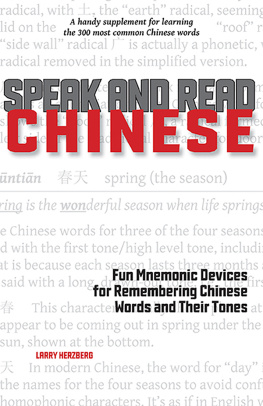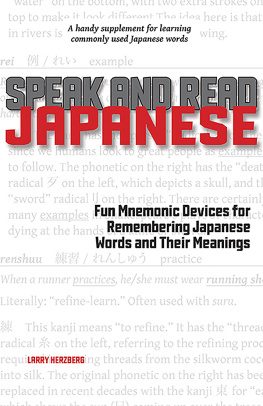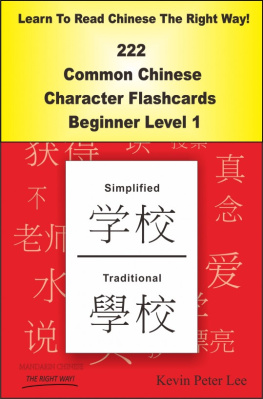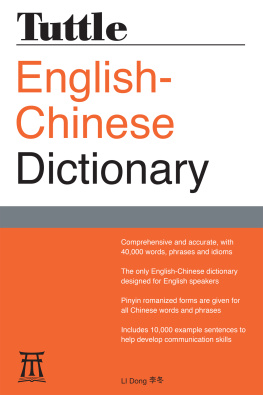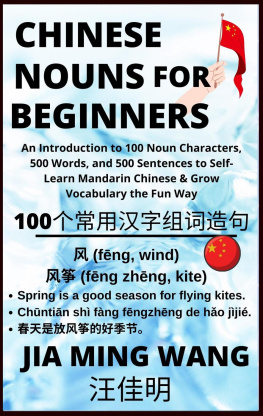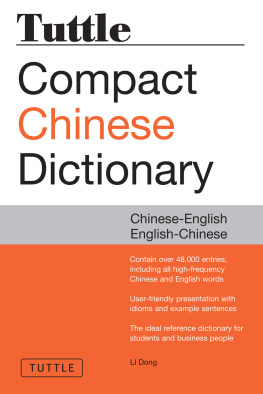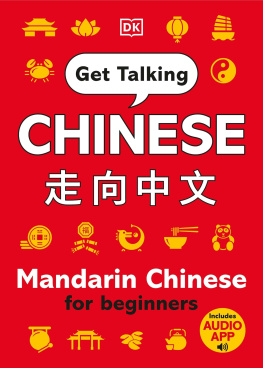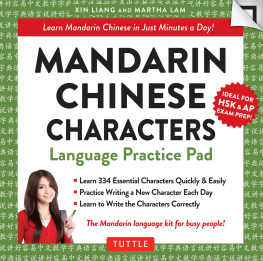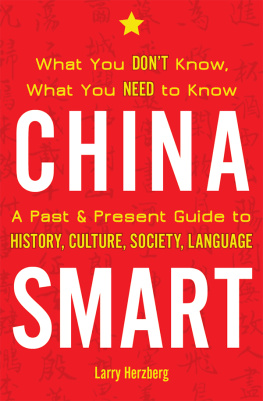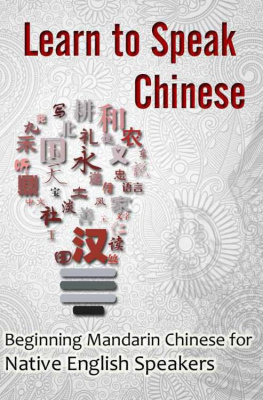Larry Herzberg - Speak and Read Chinese: Fun Mnemonic Devices for Remembering Chinese Words and Their Tones
Here you can read online Larry Herzberg - Speak and Read Chinese: Fun Mnemonic Devices for Remembering Chinese Words and Their Tones full text of the book (entire story) in english for free. Download pdf and epub, get meaning, cover and reviews about this ebook. year: 2016, publisher: Stone Bridge Press, genre: Home and family. Description of the work, (preface) as well as reviews are available. Best literature library LitArk.com created for fans of good reading and offers a wide selection of genres:
Romance novel
Science fiction
Adventure
Detective
Science
History
Home and family
Prose
Art
Politics
Computer
Non-fiction
Religion
Business
Children
Humor
Choose a favorite category and find really read worthwhile books. Enjoy immersion in the world of imagination, feel the emotions of the characters or learn something new for yourself, make an fascinating discovery.
- Book:Speak and Read Chinese: Fun Mnemonic Devices for Remembering Chinese Words and Their Tones
- Author:
- Publisher:Stone Bridge Press
- Genre:
- Year:2016
- Rating:4 / 5
- Favourites:Add to favourites
- Your mark:
- 80
- 1
- 2
- 3
- 4
- 5
Speak and Read Chinese: Fun Mnemonic Devices for Remembering Chinese Words and Their Tones: summary, description and annotation
We offer to read an annotation, description, summary or preface (depends on what the author of the book "Speak and Read Chinese: Fun Mnemonic Devices for Remembering Chinese Words and Their Tones" wrote himself). If you haven't found the necessary information about the book — write in the comments, we will try to find it.
Larry Herzberg: author's other books
Who wrote Speak and Read Chinese: Fun Mnemonic Devices for Remembering Chinese Words and Their Tones? Find out the surname, the name of the author of the book and a list of all author's works by series.
Speak and Read Chinese: Fun Mnemonic Devices for Remembering Chinese Words and Their Tones — read online for free the complete book (whole text) full work
Below is the text of the book, divided by pages. System saving the place of the last page read, allows you to conveniently read the book "Speak and Read Chinese: Fun Mnemonic Devices for Remembering Chinese Words and Their Tones" online for free, without having to search again every time where you left off. Put a bookmark, and you can go to the page where you finished reading at any time.
Font size:
Interval:
Bookmark:

Fun Mnemonic Devices for Remembering Chinese Words and Their Tones
Larry Herzberg
Stone Bridge Press Berkeley, California
Published by
Stone Bridge Press
P. O. Box 8208, Berkeley, CA 94707
TEL 510-524-8732
2016 Larry Herzberg
First printing., 2016.
All rights reserved.
No part of this book may be reproduced in any form without permission from the publisher.
Printed in the United States of America.
p-ISBN 978-1-61172-031-0
e-ISBN 978-1-61172-921-4
PREFACE
In studying eight foreign languages over many decades, I discovered that the best way for me to learn new vocabulary in those language was to think of mnemonic devices, i.e., memory hooks, for each word. I discovered that if I could relate the sound or meaning of a word I was trying to learn to a word in English, I stood a much better chance of cementing that word in my memory.
Using mnemonic devices to learn new vocabulary is not so crucial for an English speaker trying to learn a Romance language, given that 60% of words in French, Spanish, and Italian have English-language cognates. However, in a language as different from English as Chinese, it is most helpful to have clever ways at your disposal to jog your memory when trying to learn new vocabulary.
When I was first learning words like pinyi (inexpensive), it helped to think about how clothing at J.C. Penney is inexpensive. It was also easy to remember the word ch (car), since the ch sounded like a car chugging along the highway. And the Chinese word mi (to buy) was much easier to recall if I thought about going into a store and thinking, My, oh my, the high prices of things I want to buy!
I dont have particularly catchy memory hooks for every single word in Chinese. And even if I did, I could never fit them all into this book. What I have done instead is to give mnemonic devices for approximately 300 commonly used Chinese words that all students learn in the first year or two of studying Chinese. I hope that these will encourage you to think of your own mnemonic devices for the words I do not include.
I have been teaching Chinese at the college level for thirty-seven years. When some years ago I anonymously surveyed nearly a hundred of my Chinese-language students as to how helpful they thought my mnemonic devices were, nearly 100% of them answered that they found them either very helpful or somewhat helpful. Only one student responded that he/she found them slightly annoying. I have, therefore, continued to use them in my teaching and hope to share them with a wider audience.
I do want to share a few words of caution about using mnemonics to remember vocabulary. First, these are just whimsical creations that have absolutely no etymological basis. Second, mnemonic devices, or demonic devices as some of my students have called them, cannot be relied upon for exact pronunciation. For that you have to try to mimic your Chinese teacher, your Chinese friends, and the native speakers in the listening exercises that you do for your class. My encouraging you to remember the word for Japan, Rbn, by thinking of Japan as an urban country, might help you learn the word. But urban is hardly an exact guide to proper Chinese pronunciation.
I have yet to encounter another Chinese teacher who uses mnemonic devices to help students remember Chinese words. Most likely that is because most Chinese language teachers are native speakers of the language. They have been listening to and speaking in Chinese from the time they were infants and see no reason why anyone would need tricks to learn words that they acquired with their mothers milk. A non-native speaker like me who learned the Chinese language as an adult, however, understands well the difficulty of remembering words in a language that is so incredibly different from English.
Not only am I aware of no other teachers or textbooks that provide mnemonic devices for learning new vocabulary in Chinese, likewise I do not know of any resources that give clues as to how to remember the tones. In many Chinese-language classrooms students are simply expected to repeat words with the correct tones over and over until they have memorized them. This is, of course, important to do. The more you hear Chinese words spoken by native speakers with the correct tones, the easier it will be for you to remember them. Eventually, like native speakers of Chinese who do not have to think whether a word is first, second, third, or fourth tone, teachers hope you too will say words with correct tones as second nature.
For non-native speakers, however, learning the correct tone for every word is not an easy matter. I have, therefore, attempted to give helpful hints as to how you might remember the tones for the approximately 300 words included in this book. But remember, we cant consult early Chinese dynasties to discover why Chinese say each word with a particular intonation. These are just tricks to help you remember. For instance, the fact that the word for high or tall, go, is said with a high, level tone (first tone) makes complete sense. Similarly, the fact that dio, to drop, and gu, to hang, are both said with the falling tone (fourth tone) is also very understandable. That words for things like horse (m), and chair (y) are said with the low rising tone (third tone) is logical, since a horse and a chair are things that you sit down on. It is also not surprising that almost all question words in Chinese, such as shnme (what?), shi (who?), znme (how?), and nr/nl (where?) are all said with a tone that rises, namely either the second or third tone, since this is the same questioning intonation we use in English.
The reasons why certain words in Chinese are spoken with certain tones have been lost in the fog of ancient history. The mnemonic devices I have provided in this book to help you remember tones may sometimes appear to be a real stretch. However, I trust that at least some of them might help you as you struggle to learn the tones of the various words. Please remember that the most important way to remember them is to listen to native speakers and to repeat what they say to yourself as many times as you can. Also remember that if you dont know the tone, you dont know the word! There is an important difference between the words mi (to buy) and mi (to sell). Similarly there is a huge difference between wn (to ask), wn (to sniff), and wn (to kiss)!
In addition to the mnemonic devices I have provided for spoken words and their tones, I have also provided mnemonics for characters. There are books that give the actual etymology of a great number of Chinese characters. There are other books that give tricks for remembering characters in creative ways that have nothing to do with their actual origin. In this book I have tried to provide both the correct etymology, should that be known, as well as my own fun and hopefully helpful tricks for remembering how to read and write various characters.
Traditional and simplified versions of the Chinese characters
There are currently two different versions of many of the Chinese characters. Chinese in Taiwan, Hong Kong, as well as those in the U.S. and Canada continue to use the traditional form of the characters as they have been written for the past several millennia. However, in the 1950s the Chinese in Mainland China began using simplified forms of many of the characters in order to promote literacy. Most students of the Chinese language in the U.S. and Canada only learn the simplified versions of the characters, since those characters are used by the 1.35 billion people living in Mainland China.
Next pageFont size:
Interval:
Bookmark:
Similar books «Speak and Read Chinese: Fun Mnemonic Devices for Remembering Chinese Words and Their Tones»
Look at similar books to Speak and Read Chinese: Fun Mnemonic Devices for Remembering Chinese Words and Their Tones. We have selected literature similar in name and meaning in the hope of providing readers with more options to find new, interesting, not yet read works.
Discussion, reviews of the book Speak and Read Chinese: Fun Mnemonic Devices for Remembering Chinese Words and Their Tones and just readers' own opinions. Leave your comments, write what you think about the work, its meaning or the main characters. Specify what exactly you liked and what you didn't like, and why you think so.

